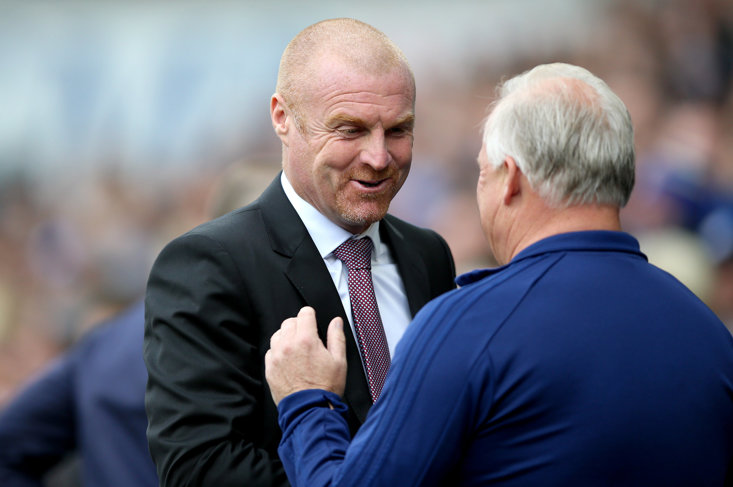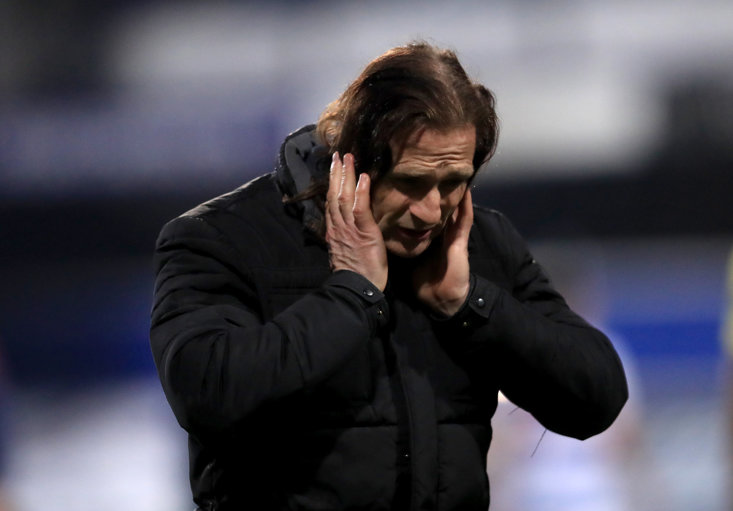In this five-part series, The Sportsman will be exploring one of football's biggest questions. Just why do we love our football clubs? What makes this entity, made up of fleeting players, ever-changing crests and variable fan bases so special to us individually? In this fifth and final part, we focus on those on the pitch. The manager and players.
There are club stalwarts, fleeting gems and loan stars. There are long-serving managers you love, and ones you can’t wait to get sacked. These are the vital figures of our club who ultimately decide whether we are miserable or overjoyed every weekend.
But can they ever feel what the fans feel?
In the modern game, in which managerial sackings are not just expected but routine, there are only a couple of names that buck the trend. One of those is the longest serving gaffer in English football, Harrogate Town manager Simon Weaver. He got the job in 2009 and 13 years, two promotions and two Wembley visits later, is the proud manager of a Football League club. But does he realise how integral he has become?
“Obviously I’ve been a consistent figurehead there, but because we have grown I think it is less dependent on one person,” he tells The Sportsman. “I’ve got the perfect fit around me. Bit by bit we have built it so there is a definite culture here. The toughest challenge with all the new players is embedding and ingraining that culture. Finding out their purpose and why they should love the club like staff and long-serving players. We’ve got to get them out in the community like we have this week, having a bite to eat in Harrogate, understanding the area. Now it is a lot less dependent on one or two people, and it is more about a team.
READ MORE:
- Why do we love our football club - part one: the fans
- Why do we love our football club - part two: the stadium
- Why do we love our football club - part three: the colours and crest
- Why do we love our football club - part four: the history
“It would be hard to imagine [my life without Harrogate Town] because in the 13 years I’ve got married, I’ve had two beautiful children and I’m settled 20 minutes away from Harrogate with schools as well. The routines are pretty much set in stone for me here. We’re building a club that hopefully the beneficiaries will be in future years when we’ve left the club. We’re growing a fanbase through the player development centre, five and six-year-olds now coming to watch, they will be grown-ups and bring their children. Hopefully they will remember the good times when we were here, but then obviously it will move on.”
Fans in the stands are absolutely desperate for those working at the club to understand what it means to them, and reflect that on the pitch. One such team which had the perfect boss who not only understood the hard-working town, but managed to put together a squad that reflected that on the pitch, was Burnley under Sean Dyche.
“Quite simply, Burnley would not have enjoyed their best decade since the 1960s and 70s without Dyche,” Chris Boden, former Burnley Express sports editor explains to The Sportsman. “He created the culture that underpinned two promotions, seven seasons out of eight in the Premier League, two top-10 top-flight finishes and a return to European competition after half a century. His only promise was sweat on the shirt, and that the minimum requirement was maximum effort, and he achieved so much more - every hoodoo, beating the old enemy Blackburn Rovers after 34 years, winning at Old Trafford, Anfield, the Emirates and Stamford Bridge…remarkable.

“Dyche recognised Burnley was a hard-working town, and produced a hard-working team, that the fans appreciated - they knew, win, lose or draw, the players gave everything, every week. As Dyche would say, hard work never went out of fashion. But he did try to be better with the ball, notably in 2017-18 when finishing seventh, which might have continued but for serious knee injuries to Robbie Brady and Steven Defour. And with more funds, who knows what sort of side Dyche might have developed?”
Even Dyche and Burnley, who seemed like the perfect match, saw their relationship run out of steam eventually. With the club close to relegation, they parted ways after 10 years, and the club moved in a new direction by appointing Vincent Kompany. But is the fan experience the same even if the brand of football has moved away from the ‘up and at ’em’ style that reflected the town?
“One of the first things that Kompany said after taking over was his desire to keep the things that worked at the club - the DNA, the culture,” Chris tells us. “Players are easily integrated into the dressing room, and leaders like Jack Cork, Jay Rodriguez, Charlie Taylor, Ashley Barnes, know the values that needed upholding. But Kompany has said often that he is more pleased by the hard work his players put in, so that remains the prerequisite.
“I think fans like to win, first and foremost, but if you can win with style, even better. It was brilliant, bloodying the big-hitters’ noses in the Premier League, but if Burnley can win promotion under Kompany and take them on at their own game, it will be interesting to see. But the fans have bought into an exciting new era - it’s fair to say things had gone a little stale, and change was necessary.”
That particular managerial journey is over, but one man who is still going strong is Gareth Ainsworth at Wycombe Wanderers. A man who has completely transformed the fortunes of the club and led them to an unthinkable second-tier season having kept them in the Football League. But despite his huge success, and the fact that most fans can’t even imagine a Wycombe without Ainsworth, there is still an obvious separation in emotion between coaching staff and fans.
“It’s a completely different love affair,” The Wycombe Way tells The Sportsman. “The word truly would suggest that a manager would feel exactly the same, feel all the same emotions as a fan would - and I’m simply not sure if that’s possible, especially in the modern game. A manager and a fan want their team to succeed for very different reasons. As far as the manager is concerned - generally speaking, although a good one - it’s still just a job. We’ve seen recently that it’s just a job - there’s very little loyalty left in football, and it’s hard to come by.

“Paul Warne has left his job at Rotherham United after almost seven years, for a little bit more money at a team in the division below, currently in transition. Millers fans have been saying for years how much he understands the club and the fans, and overnight it’s gone. Eric Cantona once said you can change your wife, but never your football team - and a fan never would. I know a couple of Bury fans who have yet to attend a football game since their liquidation, in the hope they’d one day get their club back, and it seems they might. The supporters part ways with their hard-earned cash each week, to travel up and down the country, day and night, wind, rain and snow. I don’t think you can compare much to a fan’s love for their team - even those players with a career at just one club. It’s a different ball park, a different kind of love, that can’t be truly understood, but instead has to be admired.”
Perhaps that debate is what makes the players and managers who seem to ‘get it’ so special. Steven Gerrard at Liverpool was the perfect captain for nearly two decades, and it felt so wrong to see Frank Lampard in a Manchester City shirt after his service to Chelsea.
But maybe the dugout is where we should finish this piece. Loyalty is hard to find these days, both from rash clubs and ambitious managers, and Watford have become symbolic with this short-term hire-and-fire process. This week they got rid of yet another manager, Rob Edwards, after just 11 matches. So how does the current longest-serving gaffer in English football feel when his colleagues are treated as such disposable commodities?
“It shouldn’t feel odd but it does seem to be that,” Weaver explains. “How can you actually implement your own ways of working and have your own staff? Because leadership is about that isn’t it? It’s about delegating and creating a set-up where people feel valued and unless you have got control of important parts of the business and have a say and get people settled in.
“It’s like we’ve got more than 15 new players here this season and they are going from flat to flat, a few of them, trying to settle in. Well, I’ve got to cut them some slack and look after them and make sure they feel like they belong. Well, managers are human too and they may be leaving their young family to go to another place. It might take a little bit of time to bed in, not just the philosophy, but as a person going in every day.
“We all want immediate success but it took the best of the best three and a half years, and Manchester United, with the greatest of surroundings and fanbases in the world, to achieve that.”
Perhaps managers and players will never feel exactly how we do in the stands. But there is absolutely no doubt that having a committed and long-serving manager who understands your club makes you love them more. The feeling that those on the pitch represent you as an individual is truly special.